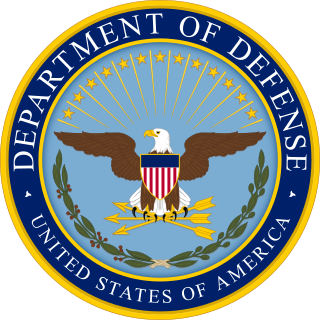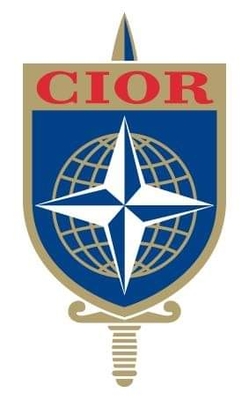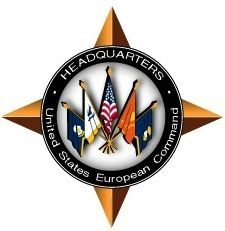
The Slovenian Armed Forces or Slovenian Army are the armed forces of Slovenia. Since 2003, it is organized as a fully professional standing army. The Commander-in-Chief of the SAF is the President of the Republic of Slovenia, while operational command is in the domain of the Chief of the General Staff of the Slovenian Armed Forces.

The Euro-Atlantic Partnership Council (EAPC) is a post–Cold War, North Atlantic Treaty Organization (NATO) institution. The EAPC is a multilateral forum created to improve relations between NATO and non-NATO countries in Europe and Central Asia. States meet to cooperate and discuss political and security issues. It was formed on 29 May 1997 at a Ministers’ meeting held in Sintra, Portugal, as the successor to the North Atlantic Cooperation Council (NACC), which was created in 1991.

The Partnership for Peace is a North Atlantic Treaty Organization (NATO) program aimed at creating trust and cooperation between the member states of NATO and other states mostly in Europe, including post-Soviet states; 18 states are members. The program contains 6 areas of cooperation, which aims to build relationships with partners through military-to-military cooperation on training, exercises, disaster planning and response, science and environmental issues, professionalization, policy planning, and relations with civilian government. During policy negotiations in the 1990s, a primary controversy regarding PfP was its ability to be interpreted as a program that is a stepping stone for joining NATO with full Article 5 guarantees.
Partnership for Peace Information Management System (PIMS) is a US Department of Defense Bilateral Cooperative Development Program started in 1996 to enable collaboration and communication between Partnership for Peace (PfP) countries and the NATO community.

The National Defense University (NDU) is an institution of higher education funded by the United States Department of Defense aimed at facilitating high-level education, training, and professional development of national security leaders. As a chairman's Controlled Activity, NDU operates under the guidance of the Chairman of the Joint Chiefs of Staff (CJCS), with Vice Admiral Peter Garvin, USN as president. It is located on the grounds of Fort Lesley J. McNair in Washington, D.C., near the White House and the US Congress.

The United States under secretary of defense for policy (USDP) is a high level civilian official in the United States Department of Defense. The under secretary of defense for policy is the principal staff assistant and adviser to both the secretary of defense and the deputy secretary of defense for all matters concerning the formation of national security and defense policy.

The State Partnership Program (SPP) is a joint program of the United States Department of Defense (DoD) and the individual states, territories, and District of Columbia. The program and the concept originated in 1993 as a simplified form of the previously established (1992) Joint Contact Team Program (JCTP). The JCTP aimed at assisting former Warsaw Pact and Soviet Union Republics, now independent, to form democracies and defense forces of their own. It featured long-term presence of extensive and expensive teams of advisory specialists. The SPP shortened the advisory presence to a United States National Guard unit of a designated state, called a partner, which would conduct joint exercises with the host. It is cheaper, has a lesser American presence, and can comprise contacts with civilian agencies. Today both programs are funded.
The Geneva Centre for Security Policy (GCSP) is an international foundation that was established in 1995 under Swiss law to "promote the building and maintenance of peace, security and stability". The GCSP was founded by the Federal Department of Defence, Civil Protection and Sports in cooperation with the Federal Department of Foreign Affairs as a Swiss contribution to Partnership for Peace (PfP).

The Interallied Confederation of Reserve Officers, commonly referred to by its French acronym CIOR, is a confederation of reserve officers' associations within NATO and beyond.

The George C. Marshall European Center for Security Studies is a bi-national United States Department of Defense and Federal Ministry of Defence (Germany) security and defense studies institute. When the Marshall Center was founded in 1993, its mission was to create a more stable security environment by advancing democratic institutions and relationships, especially in the field of defense; promoting active, peaceful, security cooperation; and enhancing enduring partnerships among the nations of North America, Europe, and Eurasia. As of Oct. 1, 2014, the Marshall Center's regional mission changed to a transnational one based on an Office of the Secretary of Defense directive to change from a European to a global participants' base.
The Center for Homeland Defense and Security at the Naval Postgraduate School (NPS) in Monterey, California is a school focusing on homeland security education.

The United States European Command State Partnership Program, according to its own mission, is a National Guard program that "links U.S. states with designated partner countries to ... support the command’s security cooperation objectives." Currently, 22 Partnerships exist "with former Soviet, Yugoslav and Warsaw Pact countries in the EUCOM Area of Responsibility." Becoming independent on the dissolution of the Soviet Union on December 26, 1991, these countries shortly requested the advice and assistance of the United States in creating new self-defense forces.
The International Security Forum (ISF) is a Swiss government-sponsored international conference on security policy in Europe, North America, and beyond. The biannual forum is held alternately in Zurich and Geneva.
Erasmus+ is the European Commission's Programme for education, training, youth, and sport for the period 2021–2027, succeeding the previous programme (2014–2020). As an integrated programme, Erasmus+ offers more opportunities for the mobility of learners and staff and cooperation across the education, training, and youth sectors and is easier to access than its predecessors, with simplified funding rules and a structure that aims to streamline the administration of the programme. The new Erasmus+ Program, running from 2021–27, is more digital, inclusive and innovative, as well as greener.

NATO Defense College (NDC) is the international military college for North Atlantic Treaty Organization countries. It is located in Rome, Italy.

The Asia School of Business (ASB) is a graduate business school based in Kuala Lumpur, Malaysia. ASB was established in 2015 through a partnership between the MIT Sloan School of Management and Bank Negara Malaysia, the Central Bank of Malaysia. It offers a range of programs, including a 12-month Master of Business Administration (MBA), a 16-month Executive MBA (EMBA), and a 12-month Master in Central Banking (MCB).
Azerbaijan has been ruled by the former Soviet Union for nearly 70 years. Azerbaijan gained its independence in October 1991 following the fall of the Soviet Union. Reestablishment of independent country has led to chaos and regression in the field of economy, education and health. In this regard, the Azerbaijani government signed the "Contract of century" and implemented reforms to develop the above-mentioned fields.

The relationship between Azerbaijan and NATO started in 1992 when Azerbaijan joined the newly created North Atlantic Cooperation Council. Considerable partnership between NATO and Azerbaijan dates back to 1994, when the latter joined Partnership for Peace program. Azerbaijan established a diplomatic Mission to NATO in 1997 by the Presidential Decree on 21 November.

Belarus–NATO relations refers to relations between the Republic of Belarus and the North Atlantic Treaty Organization (NATO).
The NATO Washington Summit Declaration is a statement approved by all 32 member states of the North Atlantic Treaty Organization (NATO) that was issued on 10 July 2024 by the national leaders that participated in the NATO 2024 Washington summit in Washington, D.C., in the United States. The declaration made frequent references to Russia's invasion of Ukraine, specifically dedicating six paragraphs assuring assistance to Ukraine for defense and security against Russia's impact on European stability. The Declaration was notable for its overt use of strong language condemning China's support of Russia during its invasion, referring to it as a "decisive enabler" of Russia's war crimes and breaches of international law by strengthening their mutual economic trade and political partnership. It also included several means of support and coordination with different NATO facilities and initiatives to promote Ukraine's security on its "irreversible path" to integration with European and Western nations, including eventual NATO accession.












